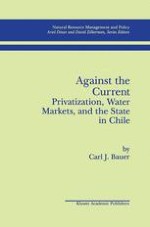1998 | OriginalPaper | Buchkapitel
Conclusions
verfasst von : Carl J. Bauer
Erschienen in: Against the Current: Privatization, Water Markets, and the State in Chile
Verlag: Springer US
Enthalten in: Professional Book Archive
Aktivieren Sie unsere intelligente Suche, um passende Fachinhalte oder Patente zu finden.
Wählen Sie Textabschnitte aus um mit Künstlicher Intelligenz passenden Patente zu finden. powered by
Markieren Sie Textabschnitte, um KI-gestützt weitere passende Inhalte zu finden. powered by
Chile’s experience with free market water policies has been uneven. The 1981 Water Code has had both advantages and disadvantages, and offers valuable lessons for other countries interested in water markets and privatized water rights. The most general lesson is that market mechanisms can do some things well and others poorly-that markets are not automatic or self-regulating but depend on their social, institutional, and geographic contexts. In Chile the Water Code has worked relatively well within the agricultural sector, although the water market itself has been limited. The Code has worked much less well at the level of river basins, where the institutional framework has revealed serious flaws in coordinating different kinds of water users and different economic sectors. These flaws reflect the current (1980) Constitution as much as the Water Code, and therefore have similar implications for other areas of public policy and environmental regulation.
